MyDigitalSSD BP4 2.5" & mSATA (240GB) Review
by Kristian Vättö on April 3, 2013 11:13 AM ESTAnandTech Storage Bench 2011
Two years ago we introduced our AnandTech Storage Bench, a suite of benchmarks that took traces of real OS/application usage and played them back in a repeatable manner. Anand assembled the traces out of frustration with the majority of what we have today in terms of SSD benchmarks.
Although the AnandTech Storage Bench tests did a good job of characterizing SSD performance, they weren't stressful enough. All of the tests performed less than 10GB of reads/writes and typically involved only 4GB of writes specifically. That's not even enough exceed the spare area on most SSDs. Most canned SSD benchmarks don't even come close to writing a single gigabyte of data, but that doesn't mean that simply writing 4GB is acceptable.
Originally we kept the benchmarks short enough that they wouldn't be a burden to run (~30 minutes) but long enough that they were representative of what a power user might do with their system. Later, however, we created what we refer to as the Mother of All SSD Benchmarks (MOASB). Rather than only writing 4GB of data to the drive, this benchmark writes 106.32GB. This represents the load you'd put on a drive after nearly two weeks of constant usage. And it takes a long time to run.
1) The MOASB, officially called AnandTech Storage Bench 2011—Heavy Workload, mainly focuses on the times when your I/O activity is the highest. There is a lot of downloading and application installing that happens during the course of this test. Our thinking was that it's during application installs, file copies, downloading, and multitasking with all of this that you can really notice performance differences between drives.
2) We tried to cover as many bases as possible with the software incorporated into this test. There's a lot of photo editing in Photoshop, HTML editing in Dreamweaver, web browsing, game playing/level loading (Starcraft II and WoW are both a part of the test), as well as general use stuff (application installing, virus scanning). We included a large amount of email downloading, document creation, and editing as well. To top it all off we even use Visual Studio 2008 to build Chromium during the test.
The test has 2,168,893 read operations and 1,783,447 write operations. The IO breakdown is as follows:
| AnandTech Storage Bench 2011—Heavy Workload IO Breakdown | ||||
| IO Size | % of Total | |||
| 4KB | 28% | |||
| 16KB | 10% | |||
| 32KB | 10% | |||
| 64KB | 4% | |||
Only 42% of all operations are sequential; the rest ranges from pseudo to fully random (with most falling in the pseudo-random category). Average queue depth is 4.625 IOs, with 59% of operations taking place in an IO queue of 1.
Many of you have asked for a better way to really characterize performance. Simply looking at IOPS doesn't really say much. As a result we're going to be presenting Storage Bench 2011 data in a slightly different way. We'll have performance represented as Average MB/s, with higher numbers being better. At the same time we'll be reporting how long the SSD was busy while running this test. These disk busy graphs will show you exactly how much time was shaved off by using a faster drive vs. a slower one during the course of this test. Finally, we will also break out performance into reads, writes, and combined. The reason we do this is to help balance out the fact that this test is unusually write intensive, which can often hide the benefits of a drive with good read performance.
There's also a new light workload for 2011. This is a far more reasonable, typical every day use case benchmark. It has lots of web browsing, photo editing (but with a greater focus on photo consumption), video playback, as well as some application installs and gaming. This test isn't nearly as write intensive as the MOASB but it's still multiple times more write intensive than what we were running last year.
We don't believe that these two benchmarks alone are enough to characterize the performance of a drive, but hopefully along with the rest of our tests they will help provide a better idea. The testbed for Storage Bench 2011 has changed as well. We're now using a Sandy Bridge platform with full 6Gbps support for these tests.
AnandTech Storage Bench 2011—Heavy Workload
We'll start out by looking at average data rate throughout our heavy workload test:
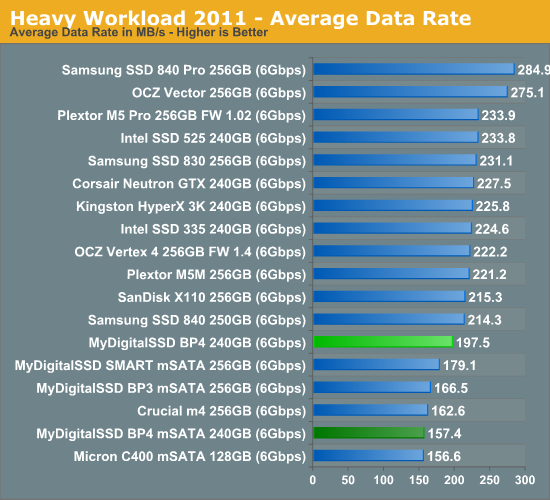
The BP4 is definitely not a record breaker and it's about 10-15% slower than most SSDs. The mSATA version is in fact slower than the mSATA BP3, although that was somewhat expected given the synthetic tests (though that's a tradeoff I'm willing to make for much, much better IO consistency). If we look at the breakdown, the BP4 is the slowest in reads but not by a large margin, so it's really the write performance that needs improvement (especially when writing to random LBAs).
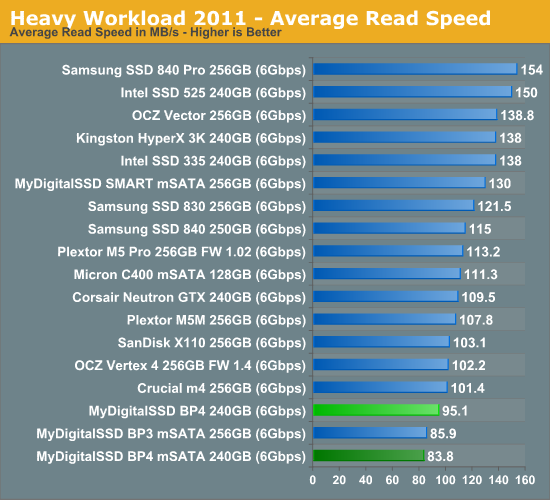
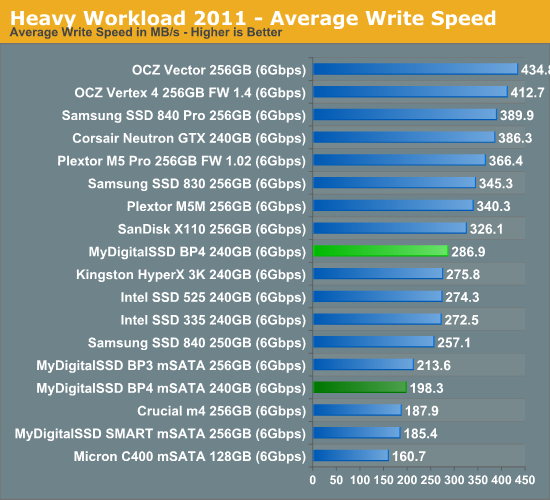
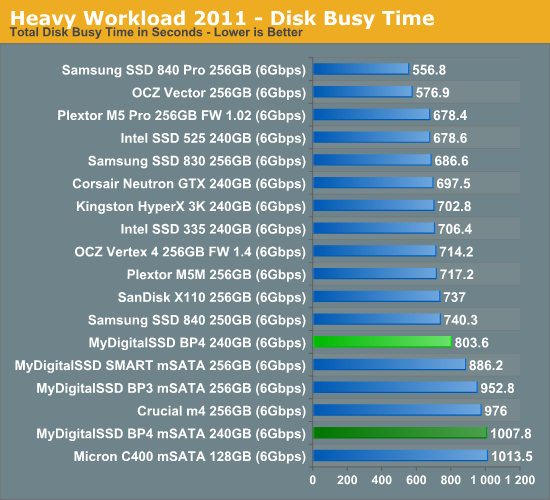
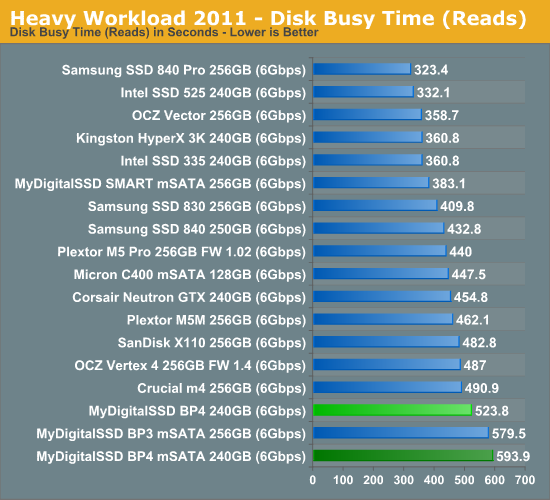
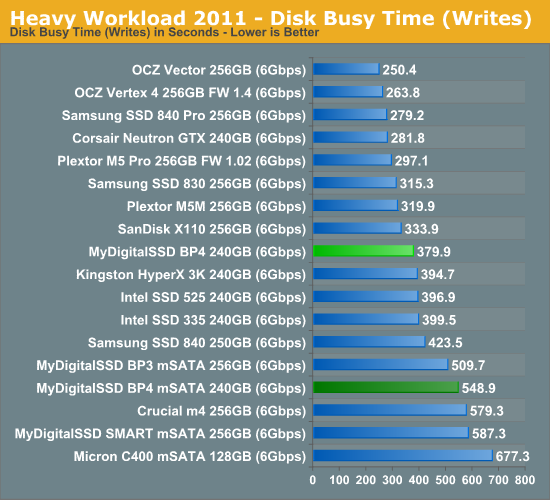










35 Comments
View All Comments
CoryS - Wednesday, April 3, 2013 - link
Everyday I check for the HTC One review, and frown :(epoon2 - Wednesday, April 3, 2013 - link
supply chain issue lolMadMan007 - Wednesday, April 3, 2013 - link
Anandtech seems to have one though, they've included it in recent Android graphics benchmark charts.thesavvymage - Wednesday, April 3, 2013 - link
they have one for sure, anand posted his thoughts on it. In that article theyve said that they are working on their reviewalexvoda - Thursday, April 4, 2013 - link
Unfortunately I lost all my interest in the HTC One ofter this:http://www.ifixit.com/Teardown/HTC+One+Teardown/13...
I find such construction method inexcusable.
SSDuser101 - Wednesday, April 3, 2013 - link
I can attest to the quality and support. I have a original BP3 from 2011 and see no reason to upgrade or change. These drives are BulletProof as the name suggests. Also followed lots of posts on Notebookreview about the drives and whenever there was a problem they fixed it. For example there was a bug with the W500 and EP121 that was pointed out and it was fixed within 4 weeks. Also they had a problem with the FW of the BP3 in early 2012 that only effected the 64GB mSATA SSD and that got fixed as well. And as far as drives dieing in the filed you will be hard pressed to find anyone who has had one brick on them. 2 thumbs up for MyDigitalSSD.Samus - Wednesday, April 3, 2013 - link
I've had a mSATA BP3 in my Elitebook Folio 9470 for about a year. Haven't had any problems...sometimes a simple controller design is better. Sandforce is ridiculously complex with a lot of things that can go wrong. With the exception of the Intel SSD 330, every Sandforce drive I've ever owned has given me problems.Johny12 - Thursday, April 4, 2013 - link
Samus, I too have had problems with my SF based SSDs earlier. But since I have started using Intel 5xx series of SSDs, my opinion about SF has changed ridiculously. I think only the first generation of their SSDs had some compatibility issues across SSD manufacturers. I am excited to hear about their yet to be launched 3rd gen controllers :DMyDigitalSSD - Wednesday, April 3, 2013 - link
Hi all Matt from MyDigitalSSD here. Thanks you for the great review. I would like to let everyone know there is a large shortage of flash in the market right now and it may be 2-3 weeks until inventory on this items is flowing again. So whatever you find on the market right now is it for about 2-3 weeks. Not the best timing for such a thing but just wanted to give a heads up for those of you wondering why you cannot find stock readily available.jhoff80 - Wednesday, April 3, 2013 - link
So, would you say that mSATA drives are generally proportional to their 2.5" counterparts? It sounds like they use the same controller, and the same flash chips (albeit fewer).For example, looking at 4KB random writes, the Intel 525 is third in performance. Would that also presumably mean that the mSATA variety of the Intel 525 would be one of the top mSATA performers?
My guess is that no, you can't assume that, but with so few sites with extensive mSATA benchmarks (and even here, there's only a couple that have been tested) it's hard to determine which is best and it'd be nice to have some way to figure it out other than guessing.